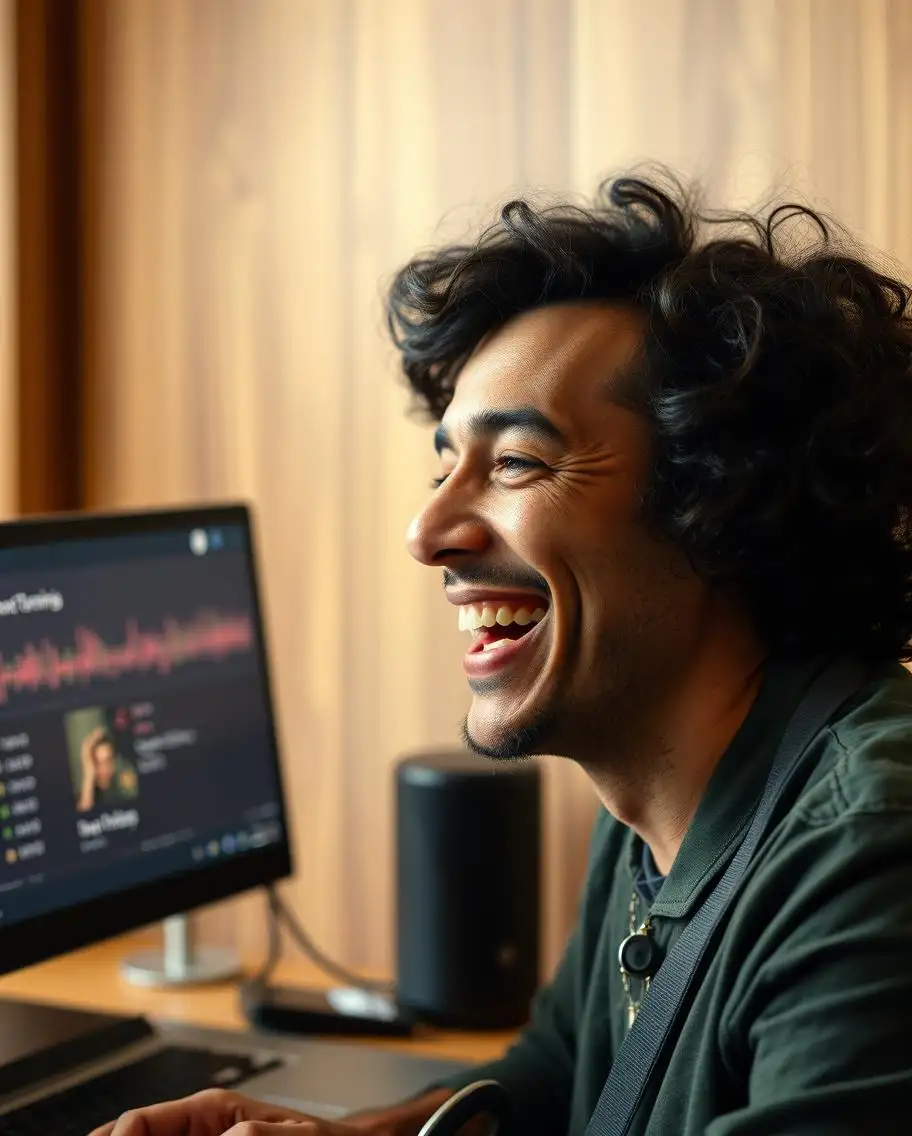Unlocking New Paths for Indie Artists with Blockchain in the Music Industry
How blockchain is revolutionizing the music industry for indie artists.
Blockchain technology is making big waves in the music industry, and indie artists are starting to see some real benefits. At its core, blockchain is like a super-secure, transparent ledger that records transactions across a network of computers, making it nearly impossible for anyone to tamper with the data.
For indie artists, this means a game-changing shift in how music is distributed and consumed. Instead of relying on record labels and streaming platforms that take a cut of the revenue, blockchain lets indie artists distribute their music directly to their fans. This new way of doing things gives artists full ownership and control over their work, and they get to keep a bigger slice of the earnings.
Imagine having complete control over your music, with every stream, download, or sale going straight to you, without all the middlemen taking their share. That’s the promise of blockchain technology, which is shaking up how music rights are managed and how artists get paid.
The Emerging Potential of Blockchain Within The Music Industry
Even though blockchain in music is still a relatively new idea, it has some impressive potential to tackle major challenges in the industry. Let's explore some of the ways it could be used.
Cutting Out the Middlemen
Blockchain’s distributed ledger technology could eliminate the need for intermediaries in music sales and streaming. Today, streaming services have changed how we listen to music, making it more accessible than ever. However, these platforms also act as middlemen between artists and fans, adding extra layers—and costs—to the process. Blockchain’s decentralization offers a secure, reliable way to handle transactions without third-party involvement.
Reducing Costs
With blockchain, digital streaming services can be created where every sale and stream is paid directly to the artist, without any middleman fees. This is made possible through blockchain-powered smart contracts that automatically trigger payments once certain conditions are met. As a result, musicians and contributors can get paid instantly when their music is streamed or sold.
Building Direct Relationships
By cutting out third parties, blockchain also paves the way for more direct and transparent relationships between musicians and their fans. This direct connection can help build trust and loyalty, allowing fans to support their favorite artists directly.

Boosting Artist Earnings
With direct payments, musicians can also see a bigger slice of the pie. Currently, intermediaries often take a large chunk of the revenue, leaving artists with a smaller share. Blockchain can help change this, ensuring that creators get higher rewards for their work.
Protecting Intellectual Property
Protecting intellectual property is a huge challenge in today’s music industry, but blockchain offers a promising solution. For instance, a song stored on a blockchain is tied to a unique identifier, protecting it from fraud. Blockchain’s unchangeable nature ensures transparency and gives creators control over their work, making illegal downloads nearly impossible. NFTs are a prime example of how blockchain is being used to support authentic ownership in music.
Creative Revenue Streams
Lastly, blockchain can help indie artists reach new audiences and create steady revenue streams from their fan base. Platforms like ANote Music, for instance, allow musicians to access funds through user investments in royalties. Fans can even buy and sell music royalty shares on a secondary market.

Top 10 Music Blockchain Platforms and Companies
Music streaming platforms that use cryptocurrency and blockchain tech have been gaining popularity lately. These platforms help musicians earn more by connecting directly with their fans, cutting out the middlemen, and offering fairer, more transparent revenue-sharing models.
I’ve put together a list of ten companies using blockchain to create a better experience for both artists and fans:
- Digimarc
Digimarc develops solutions for licensing intellectual property in audio, video, and images. They're integrating blockchain to help with music licensing. Their music fingerprinting tech, Digimarc Barcode, tracks music sources, measures usage, and forecasts payments, providing a clear view of music rights holders. - Blockpool
Blockpool is a blockchain company that creates custom code, offers consulting, and helps businesses incorporate ledger technology. In music, they develop smart contracts, and digital tokens, and manage licensing and intellectual property rights, helping artists integrate blockchain throughout production, distribution, and management. - MediaChain
MediaChain is a peer-to-peer blockchain database that lets users share info across apps and organizations. It organizes open-source data and works with artists to ensure they get paid fairly, drafting smart contracts that specify royalty terms clearly, without intermediaries. - Ujo
Ujo uses decentralized tech to create a database of music ownership rights and automate royalty payments. Artists can upload, publish, manage distribution, and control licenses on Ujo’s blockchain-based platform. It also uses the Ethereum network to simplify music ownership and enable smart contract payments. - Choon
Choon is a music streaming marketplace that uses blockchain to ensure artists get paid fairly and promptly. Their Ethereum-based platform creates smart contracts between artists and song contributors, ensuring they receive a fair share of the revenue—usually around 80%. - Open Music Initiative (OMI)
OMI is a nonprofit with 200 members advocating for an open-source framework in the music industry. They use blockchain to identify and pay rightful music owners fair royalties, believing that blockchain’s transparency and data analytics can improve artist compensation. They’ve partnered with companies like Red Bull Media, Soundcloud, and Netflix, and are working with Sony, YouTube, and Spotify to modernize royalty payments. - OPUS
OPUS is a decentralized music hosting, discovery, and listening network that allows users to fund artists directly. Built on the Ethereum blockchain, it cuts down on server costs using the Interplanetary File System. OPUS aims to give artists 90% or more of the revenue, compared to the under 20% typical on many streaming platforms. - Vezt
Vezt lets music fans directly fund their favorite artists in exchange for royalties. They collect royalties from record labels and other entities on behalf of fans, using blockchain tech to track payments. Through an Initial Song Offering (ISO), musicians and songwriters can receive funding in exchange for a portion of a song’s earnings. - Musicoin
Musicoin is a music streaming network based on a shared economy model, allowing music to be created, listened to, and shared as digital files and streams. Their blockchain ensures secure, transparent peer-to-peer sharing, with artists receiving 100% of the streaming revenue paid in MUSIC, a universal currency. - Blokur
Blokur, based in the UK, is a global publisher of data for music management and monetization. They use AI and blockchain to aggregate rights data into a single database, allowing music publishers to catalog their work, get it verified by the community, and preserve it on the blockchain. Their AI checks key data to resolve discrepancies and ensure artists are paid accurately.
Final Thoughts
The future is full of possibilities for indie artists. While the music industry has its challenges, blockchain technology could be the game-changer that helps solve many of them. This tech offers indie artists and producers a way to gain more control over their work and navigate their careers more effectively. As you step into the music scene, exploring blockchain innovations could open up new opportunities to elevate your craft.
Blog Article Tags
Blockchain Music Industry Indie Artists Technology Revenue OwnershipMore Articles
Where To Find Good Indie Music - If you're a long time fan or first time listener of Indie music, we'll show you the best methods for discovering the music you love.
Breaking Into The Music Festival Circuit As An Independent Artist - Let's learn some strategies for indie artists targeting music festival performances.
The Role of Music Managers in the Music Business - Find out why music managers play important roles in an artists career.
Seven Secrets to Help You Master the Lead Guitar - I show you the secrets of top lead guitar players to help you improve.
The Impact of Indie Music Festivals and Their Role in Shaping the Indie Music Landscapes - I share with you the impact of today's music festivals on indie artists careers.


